study和learn的区别
(人教版+汤姆森)初三英语同步辅导(含同步练习)Unit1 How do you study for
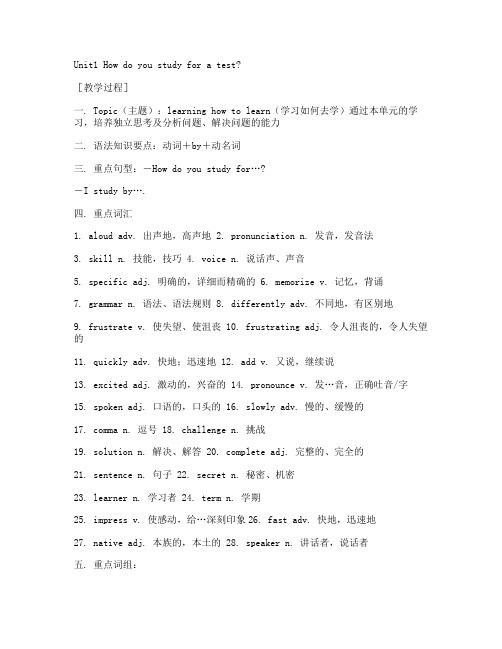
Unit1 How do you study for a test?[教学过程]一. Topic(主题):learning how to learn(学习如何去学)通过本单元的学习,培养独立思考及分析问题、解决问题的能力二. 语法知识要点:动词+by+动名词三. 重点句型:-How do you study for…?-I study by….四. 重点词汇1. aloud adv. 出声地,高声地2. pronunciation n. 发音,发音法3. skill n. 技能,技巧4. voice n. 说话声、声音5. specific adj. 明确的,详细而精确的6. memorize v. 记忆,背诵7. grammar n. 语法、语法规则 8. differently adv. 不同地,有区别地9. frustrate v. 使失望、使沮丧 10. frustrating adj. 令人沮丧的,令人失望的11. quickly adv. 快地;迅速地 12. add v. 又说,继续说13. excited adj. 激动的,兴奋的 14. pronounce v. 发…音,正确吐音/字15. spoken adj. 口语的,口头的 16. slowly adv. 慢的、缓慢的17. comma n. 逗号 18. challenge n. 挑战19. solution n. 解决、解答 20. complete adj. 完整的、完全的21. sentence n. 句子 22. secret n. 秘密、机密23. learner n. 学习者 24. term n. 学期25. impress v. 使感动,给…深刻印象26. fast adv. 快地,迅速地27. native adj. 本族的,本土的 28. speaker n. 讲话者,说话者五. 重点词组:1. 做生字卡 make flashcards2. 向某人求助 ask sb. for help3. 做某事最好的办法the best way to do…4. 例如for example5. 询问ask about6. 根本;一点也不not …at all7. 结束做… end up (doing)sth.8. 用汉语in Chinese 9. 听磁带listen to cassettes10. 口语spoken English 11. 出错make mistakes12. 参加英语俱乐部join an English club13. 练习做…practice doing… 14. 首先first of all15. 开始to begin with 16. 后来later on17. 不敢做…be afraid to do… 18. 在课堂上in class19. 造句make sentences 20. 作笔记take notes21. 决定做…decide to do… 22. 喜欢做…enjoy doing sth.23. 写下;记下write down 24. 组成make up25. 在去…路上on one’s way to 26. 因…而惭愧be ashamed of27. 过时behind the times 28. 关闭turn off29. 嘲笑laugh at 30. 最糟糕的是worst of all31. 适应;适合fit in 32. 如今;现在these days33. 成为…高手become an expert at 34. 放弃give up35. 向某人道别say goodbye to sb. 36. 考虑think about六. 课文解析I. 1a Check (√)the ways you study for an English test. Then add other ways you use sometimes.--by working with friends --by listening to cassettes--by making flashcards --by asking the teacher for help--by reading the textbook --__________________--by making vocabulary lists --__________________1. “by+动名词”常常表示手段、方式或方法,可以用来回答“how”引导的特殊疑问句eg: -How did you finish the job so soon?你是用什么方法这么快就干完了?--By climbing on the roof.我爬到屋顶上做的。
英语常用易混淆单词词组的区别用法(汇总3)
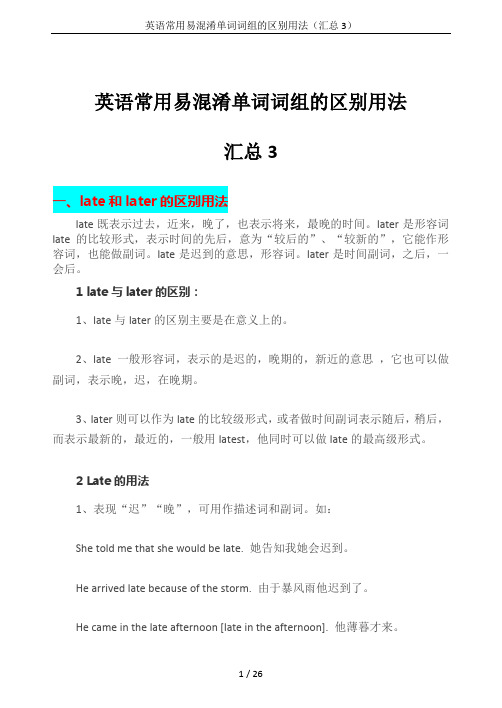
英语常用易混淆单词词组的区别用法汇总3一、late和later的区别用法late既表示过去,近来,晚了,也表示将来,最晚的时间。
later是形容词late的比较形式,表示时间的先后,意为“较后的”、“较新的”,它能作形容词,也能做副词。
late是迟到的意思,形容词。
later是时间副词,之后,一会后。
1 late与later的区别:1、late与later的区别主要是在意义上的。
2、late 一般形容词,表示的是迟的,晚期的,新近的意思,它也可以做副词,表示晚,迟,在晚期。
3、later则可以作为late的比较级形式,或者做时间副词表示随后,稍后,而表示最新的,最近的,一般用latest,他同时可以做late的最高级形式。
2 Late的用法1、表现“迟”“晚”,可用作描述词和副词。
如:She told me that she would be late. 她告知我她会迟到。
He arrived late because of the storm. 由于暴风雨他迟到了。
He came in the late afternoon [late in the afternoon]. 他薄暮才来。
留意,不要以为lately 是late 的副词情势。
2、用于be late (in) doing sth 或be late with sth, 意为“做某事做晚了或做迟了”。
如:He was late (in) getting up this morning. 明天早上他起床起得迟。
We were late with lunch [in having lunch] today. 我们明天午饭吃得迟。
比拟:be late for 意为“做……迟到”。
如:I’ve never been late for work. 我下班历来没迟到过。
Hurry up, or you’ll be late for school. 赶紧,不然你上学就要迟到了。
中学生英语学习常见错误之三

中学生英语学习常见错误-----之三Iif[误] If it will rain I won't go to school tomorrow.[正] If it rains I won't go to school tomorrow.[析]由i f 引起的状语从句要用一般时表示将来。
[误] I want to know if he comes here tomorrow.[正] I want to know if he will come here tomorrow.[析] if 所引起的如果是宾语从句则不能用一般现在时表示将来。
[误] I want to know if it will rain tomorrow he will come or not.[正] I want to know if it rains tomorrow he will come or not.[析]这里的 if 从句是整个宾语从句的条件状语,所以,还应用一般时表示将来。
ill[误] He spent many years looking after his ill father.[正] He spent many years looking after his sick father.[析] ill 和s ick 都可以作表语,如: I'm i ll (sick). 美国英语中常用s ick,而英国英语中两者都可用,但i ll 一般不作定语。
in[误] In a cold morning, I went to school alone.[正] On a cold morning, I went to school alone.[析]在i n the morning 或i n the afternoon 词组中,不论在这两个名词的前或后加任何修饰词,其介词i n 都要变为o n.[误] I will finish it after two days.[正] I will finish it in two days.[析]中文中几天以后可以完成,或几天后来取,在译为英文时都不要用a fter,而要用i n.如: He will be back in a few days.in into作为副词应用i n,而不能用i nto,如: Come i n, p lease. 又若在句中不涉及到动词的位置,只是表达空间的位置时用i n,如: The teacher in the office ismy m other. 但在g o, r un, c ome, w alk, d ive 等词后则要用i nto. 如: She d ivesinto the river.instead[误] The boy stayed in bed all day instead to go to school.[正] The boy stayed in bed all day instead of going to school.[析]i nstead o f 其后要接动名词、名词或代词,而不能用不定式,如:I c hoosethis book instead of that one.[误] The beer here is not good, so I drink wine instead of it.[正] The beer here is not good, so I drink wine instead.[析] instead 是副词,而i nstead o f 是介词短语。
新标准英语六年级第八册第十模块复习与练习

新标准英语六年级第八册第十模块复习与练习M10单词1、middle school 中学。
go to middle school上中学。
例句:Are you going to go to middle school this September? 2、study/ /v.学习。
study-studies-studying-studied辨析:【learn和study】learn和study 意思是‚学习‛时,learn 是刚开始学的时候,study 是学到一定程度的时候, 有研究的意思.I am learning English. 我在学英语. (刚开始学) I am studying English. 我在学英语. (以前学过了, 但是现在是学复杂一点的英语, 如高级听力等)。
learn 还有"学会,学到"的意思。
It takes a long time to learn to draw well.学会画画要花很长时间。
learn亦可指向某人学习,从某处学习及学习一门技能等。
如 learn music, learn new words, learn to skate, learn from Lei Feng。
study为‚学习,研究,钻研‛,强调学习的过程,指深入系统地学习,带有努力,勤奋的意味。
其学习对象往往是科学,艺术和需要深入探讨,研究的问题及学科,不是单纯地获得技巧。
如:study medicine, study science, study a map 。
在指某学科的‚学习‛时,或在不需要强调两者的区别时, learn 和study 可以换用。
How long have you learned/ studied Japanese? 你学习日语有多久了?We must keep on learning/ studying if we do not want to lag behind the times. 如果我们不想落在时代后面的话,就必须不断学习。
learn与study的区别(可编辑修改版).
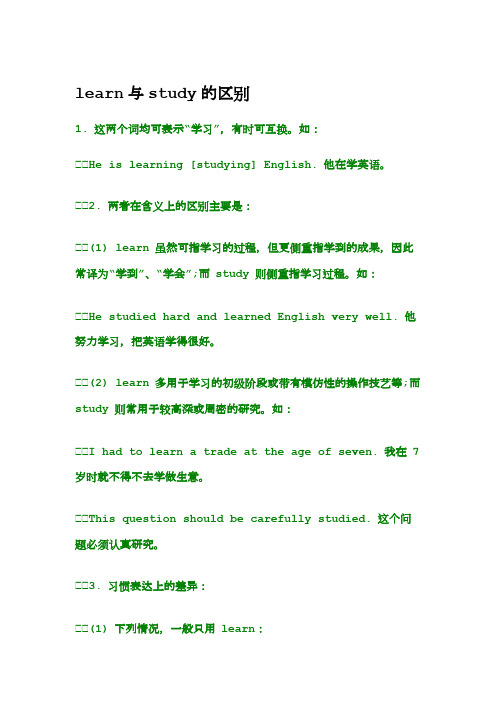
learn与study的区别1. 这两个词均可表示“学习”,有时可互换。
如: He is learning [studying] English. 他在学英语。
2. 两者在含义上的区别主要是: (1) learn 虽然可指学习的过程,但更侧重指学到的成果,因此常译为“学到”、“学会”;而 study 则侧重指学习过程。
如: He studied hard and learned English very well. 他努力学习,把英语学得很好。
(2) learn 多用于学习的初级阶段或带有模仿性的操作技艺等;而study 则常用于较高深或周密的研究。
如: I had to learn a trade at the age of seven. 我在 7 岁时就不得不去学做生意。
This question should be carefully studied. 这个问题必须认真研究。
3. 习惯表达上的差异: (1) 下列情况,一般只用 learn: a. 用于 learn from,表示“向……学习”。
如: We must learn from each other. 我们必须互相学习。
b. 后接不定式,表示“学会(学习)做某事”。
如: He’s learning (how) to drive a car. 他在学习开车。
You ought to learn (how) to be patient. 你必须学会耐心。
注:有时可接动名词(主要是指技艺或技术方面的动名词)。
如: She learns to swim [swimming]. 她学习游泳。
c. 用于某些谚语。
如: Live and learn. 活到老,学到老。
Never too old (late) to learn. 再老(晚)也能学。
Soon learnt, soon forgotten. 学得快,忘得快。
(2)下列情况,一般只用 study: a. 表示在某校学习。
learn 的用法

learn 的用法一、学习"learn"的基本用法"Learn"是一个英语动词,意为学习、获得知识或技能。
在句子中,"learn"常用于表示个人通过研究、实践或经历等方式获得新知识或技能。
下面将详细介绍"learn"的几种基本用法。
1. learn + from + 源头:通过某个来源获取知识例如:I learned a lot from my biology teacher.(我从我的生物老师那里学到了很多知识。
)2. learn + how to + 动词原形:学会如何做某事例如:She learned how to play the guitar by watching online tutorials.(她通过观看在线教程学会了弹吉他。
)3. learn + that + 从句:从特定消息、事件中获取信息例如:I learned that they are getting married next month.(我从消息中得知他们下个月要结婚。
)4. learn + about + 主题/名词:获得关于某个主题或领域的信息例如:We learned about the history of ancient Egypt in our history class.(我们在历史课上学习了古埃及的历史。
)5. learn + by/through + 名词/动名词/代词/介词短语/clause: 通过某种方式学习例如:- She learns by watching others.(她通过观察他人学习。
)- We learn through experience.(我们通过经验学习。
)- They are learning through online courses.(他们正在通过在线课程学习。
)- He learns best by listening to podcasts.(他通过听播客方式最有效地学习。
2020年新目标人教版七年级下unit6辅导讲义设计(有答案)
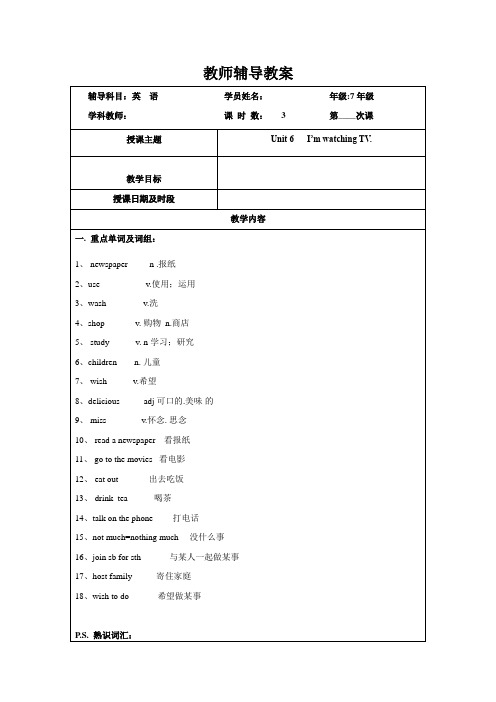
例句
other
“另一个或另一些”是泛指,当形容词或代词用
Some children like apples, other children like bananas.
the other
表示范围内的另一个(范围内一共两个)
I have two pens. One is red and the other is green
learn
侧重于学习的结果,意为“学会”,用于初级阶段的学习。
learn from sb. “向某人学习”
He learns English on the radio.
The baby is learning to speak.
We must learn from each other.
【即学即练】
Just come here a moment.
Just a minute, please.
3) just相关短语
just now刚才
just then就在那时
4. I’d love to.我很乐意。
【解析】本句为省略句,相当于I’d love to eat out.
I’d love to=I’d like to,其中I’d =I would.
A. other B. another C. others D. the other
3) The supermarket is on _____ side of the street.
A. other B. another C. the other D. others
4) There are three books on my table. One is here. Where are ___?
初中英语【单词】重点核心词汇
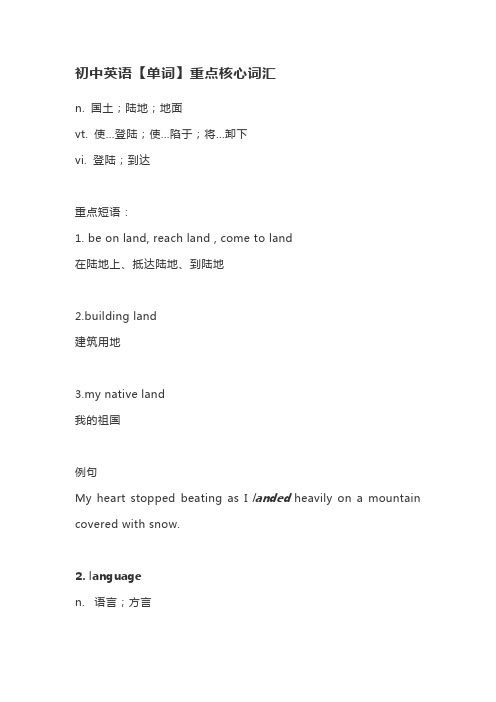
初中英语【单词】重点核心词汇n. 国土;陆地;地面vt. 使…登陆;使…陷于;将…卸下vi. 登陆;到达重点短语:1. be on land, reach land , come to land在陆地上、抵达陆地、到陆地2.building land建筑用地3.my native land我的祖国例句My heart stopped beating as I landed heavily on a mountain covered with snow.2. languagen. 语言;方言重点短语foreign languagen. 外语;外文english language英文;英语语言学chinese language汉语language learning语言学习second language第二语言body language身体语言例句Chinese is becoming a global (全球的) language and its popularity has risen around the world.3. largeadj.大的;巨大的largelyadv. 主要地;大部分;大量地重点短语at large详尽的;未被捕的,整个的a large amount of大量的(接不可数名词)a large quantity of大量的词语辨析great, grand, big, large这组词都有“大的”的意思,其区别是:great 普通用词,可指具体东西的“大”,但更常指事物的重要,人的行为、品格的伟大等,带一定的感情色彩。
grand 侧重指盛大、绝大,有气派。
big 常用词,使用广泛,较口语化。
多指体积、重量或容量等方面的“大”,有时也用于描写抽象之物。
large 普通用词,含义广,指体积、面积、容量、数量以及程度等方面的大,具体或抽象意义均可用。
例句The New York Times reported that large parts are already dead, and the reef system might be gone by 2030.4. lastadj. 最后的;最近的,上一次的;最终的;最差的;仅存的adv. 最近,上次;最后pron. 最后的人或事物;最近发生的事情;最终v. 持续;持久;继续任职;存活;重点短语at last最后;终于in the last在最后;[法]在终审时at the last直到最后last for持续;延续;历时…词语辨析:the last / the latestthe last 可指一系列事物中最后一个。
- 1、下载文档前请自行甄别文档内容的完整性,平台不提供额外的编辑、内容补充、找答案等附加服务。
- 2、"仅部分预览"的文档,不可在线预览部分如存在完整性等问题,可反馈申请退款(可完整预览的文档不适用该条件!)。
- 3、如文档侵犯您的权益,请联系客服反馈,我们会尽快为您处理(人工客服工作时间:9:00-18:30)。
Study和Learn的用法辨析
1. learn为“学习,学会”,侧重学习的成果,指从不知到知,从不会到会的学习,强调通过学习去获得知识和技能,它没有凭勤奋努力而获得知识的意味。
主要用于学习的初级阶段或带有模仿性的操作技艺等learn亦可指向某人学习,从某处学习及学习一门技能等。
如learn music, learn new words, learn to skate, learn from experience,
2. study为“学习,研究”,强调学习的过程,常用于较高深或周密的研究。
其学习对象往往是科学,艺术和需要深入探讨,研究的问题及学科,不是单纯地获得技巧。
如:study science, study a map, study engineering, study painting。
下列句子中的learn 和study均不能互换:
If you study hard, you'll learn the language well.
如果你努力学习的话,你会把这门语言学好。
She studied late at night. 她晚上学习到很晚。
He is studying the problem of X-rays. 他正在研究X射线的问题。
3.在指某学科的“学习”时,或在不需要强调两者的区别时, learn 和study可
以换用。
如:How long have you learned/ studied Japanese? 你学习日语有多久了?
下列情况,一般只用learn:
(1)用于learn from,表示“向……学习”。
如:We must learn from each other. 我
们必须互相学习。
(2)后接不定式,表示“学会(学习)做某事”。
如:He’s learning (how) to drive a
car. 他在学习开车。
You ought to learn (how) to be patient. 你必须学会耐心。
注:有时可接动名词(主要是指技艺或技术方面的动名词)。
如:She learns to swim [swimming]. 她学习游泳。
(3)用于某些谚语。
如:Live and learn. 活到老,学到老。
Never too old (late)
to learn. 再老(晚)也能学。
Soon learnt, soon forgotten. 学得快,忘得快。
下列情况,一般只用study:
(1) 表示在某校学习。
如:He is studying at Beijing University. 他在北京大学学习。
(2) 用于祈使句或与hard 连用。
如:Study hard and make progress every day. 好好学习,天天向上。
3. 用于某些习语。
如:study late into the night 学习到深夜
4. 其他用法区别除表示“学习”外,learn 还表示“听说”“得知”等义;study 还表示“打量”“仔细看”等义。
